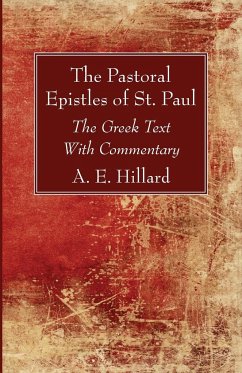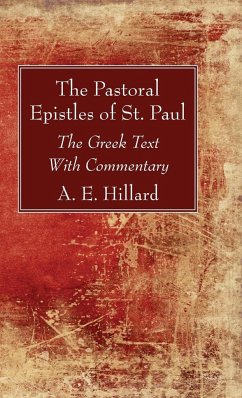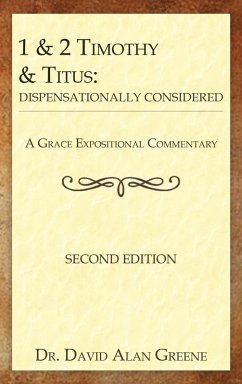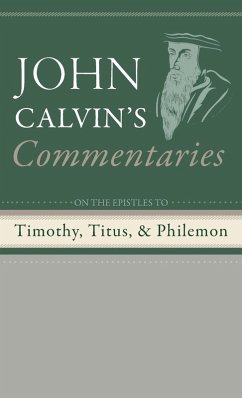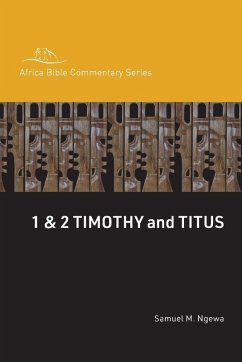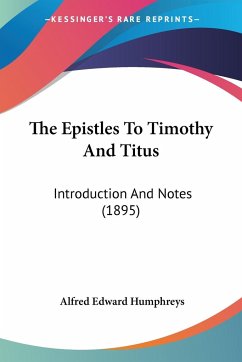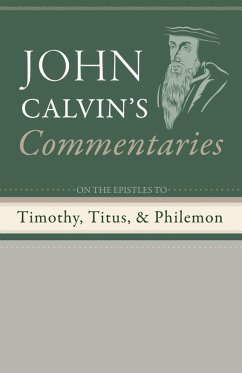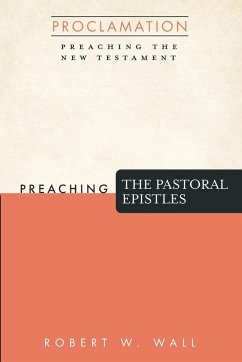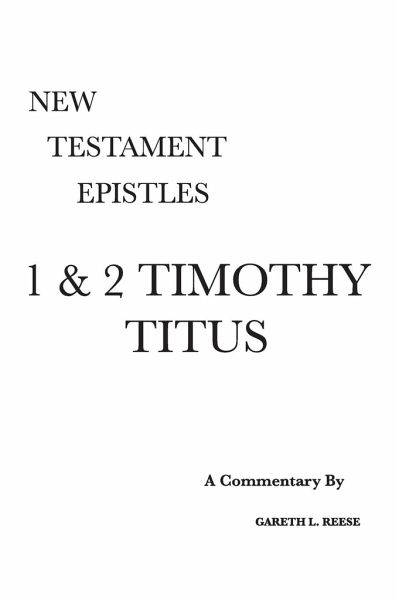
1 & 2 Timothy and Titus
A Critical & Exegetical Commentary

PAYBACK Punkte
21 °P sammeln!
This is a phrase-by-phrase commentary and exposition of the New Testament books of 1 & 2 Timothy and Titus. This commentary is in use as a college textbook, yet is suitable for the lay church member. "Letters to Young Preachers" is a good way to designate the New Testament writings of 1 & 2 Timothy and Titus. The churches where these preachers ministered were of different ages (the Ephesian church was ~12 years old, while those on Crete were more recently planted), but both faced similar needs if they were to continue growing. These letters contain timeless instructions to preachers about what...
This is a phrase-by-phrase commentary and exposition of the New Testament books of 1 & 2 Timothy and Titus. This commentary is in use as a college textbook, yet is suitable for the lay church member. "Letters to Young Preachers" is a good way to designate the New Testament writings of 1 & 2 Timothy and Titus. The churches where these preachers ministered were of different ages (the Ephesian church was ~12 years old, while those on Crete were more recently planted), but both faced similar needs if they were to continue growing. These letters contain timeless instructions to preachers about what to emphasize in their ministries so the churches they serve and to whom they preach will be what Christ wants them to be. Leaders and churches who want solid and lasting growth would do well to hear these directives. This commentary is conservative and evangelical Christian in its outlook, yet skillfully examines the Scriptures from multiple theological viewpoints. Introductory Studies cover authorship and attestation, the place and date of writing, the original target audience addressed, and the original purpose for writing. Introductory Studies also discuss questions raised about the Pastoral Epistles by higher criticism – the historical, theological, ecclesiastical, and literary/linguistic arguments adduced against the genuineness of these epistles, and especially against Paul’s authorship. Several Special Studies address important topics germane to the Pastoral Epistles. What did Paul teach about the role of wives and women within the church? What is the role of elders and deacons in the church? What is an evangelist’s work, and is that role still relevant in the 21st century? Since this commentary presumes the God-inspired nature of all Biblical writing, the author seeks to harmonize the teachings of 1 & 2 Timothy and Titus with other relevant Scriptures, and also helpfully examines the original language in which the epistles were written. An annotated bibliography of other commentaries on 1 & 2 Timothy and Titus is included to encourage readers to extend their own studies. This volume continues the author's commentary series on the books of the New Testament. It is written from the unique standpoint of the Restoration Movement, a position which allows him to approach Scripture with no special theological doctrine or dogma to defend and explicate. This approach provides an unhindered freedom to listen to what the Holy Spirit would tell us within the pages of the sacred Scriptures. By deliberately employing the time-honored grammatico-historical method of interpretation, the Word of God is allowed to impress upon our minds the intent the Divine Author had in mind. The Restoration Movement, which delights to restore things the way they were done in the church we read about in the New Testament, surely needs to hear what the Pastorals say about public worship, the "must" of qualified elders and deacons, sound doctrine, Christian lifestyles, opposition to false teachers, and the qualifications and work of an evangelist. These epistles offer guidelines concerning the lifestyle the preacher is to live, and the epistle to Titus even offers a series of topics the preacher should address as he tries to nourish and help individual Christians and the congregation to grow. If preachers, elders, deacons, and church members will do things like the Pastoral Epistles suggest, perhaps the church in our century will have fewer spots and blemishes, and will be closer to the holy and blameless bride whom Jesus would present in all her glory to Himself (Ephesians 5:27). The author is Professor Emeritus of the New Testament at Central Christian College of Bible (Moberly, MO).




